Latest EPA Research 2030 Reports

Research 468: Managing Small Stream Networks for Improved Water Quality, Catchment Biodiversity and Ecosystem Services Protection
Authors: Mary Kelly-Quinn, Michael Bruen, Mike Bowes, Jens Carlsson, Edward Cox, Angela Gurnell, Sinéad Hogan, Ann-Marie Kelly, Marcin Penk, John O’Sullivan and Jeremy Piggott, November 2024
Year: 2024
Ireland has many commitments to both water quality and biodiversity under policies like the Water Framework Directive, national biodiversity plans, the Habitats Directive and the Nature Restoration Law. Considering these this research refocused attention on the Small Stream Network (SSNet) in terms of water quality management and policy. SSNet is the first large-scale research project in Ireland on first- and second-order streams to undertake investigations spanning hydrochemistry, multiple ecological elements and likely impact of climate change stressors. It advances knowledge on the role of small streams in water quality, biodiversity and ecosystem services and the pressures they face from diffuse and point source pollution. It recommends more water quality monitoring of small streams to help protect biodiversity and water quality further downstream, with priority protection given to areas with high regional biodiversity. Citizen science can potentially facilitate better monitoring.

Research 467: Raising Awareness of and Educating Consumers about Reusable Sanitary Products: Developing Strategies for the Promotion of Reusable Nappies, Wipes
Author: Abigail O’Callaghan-Platt, November 2024
Year: 2024
Widespread use of disposable single-use sanitary items, nappies and disposable wipes are causing harm to the land and marine environments. Many sanitary items can contain significant levels of plastic (e.g. up to 90% plastic in some menstrual items) and can form a large proportion of household waste (e.g. in 2022 nappies accounted for 10%). With the Single Use Plastics Directive and Waste Action Plan for a Circular Economy aiming to reduce single use plastics, and extend producer responsibility requirements, this research focuses on the use of more sustainable options for nappies, wipes and menstrual items. The research combined educational workshops and the provision of reusable alternatives through both the ‘Cloth Nappy Incentive Scheme’ and the ‘No Plastic. Period. Programme'. With a high level of public participation the research identifies four further research and four policy recommendations to enable increased national uptake of reusable nappies, baby wipes and menstrual items.

Research 466: Forecasting WEEE Arising for Electric Vehicle Batteries and Photovoltaic Panels in Ireland
Authors: Michael Johnson, Narjes Fallah, Sheila Killian and Colin Fitzpatrick, October 2024
Year: 2024
Globally, energy systems are undergoing two simultaneous and radical transformations that present a new set of challenges in sustainable waste management: the electrification of the transportation network and the decarbonisation of the electricity grid. This research examines challenges and models scenarios for the sustainable management of LongWEEE. Electrical devices with a longer than average lifetime are classed as LongWEEE with this study focusing on solar photovoltaic (PV) panels and electric vehicle batteries (EVBs). Modelled results for both sectors out to 2050 show a lot of uncertainty regarding the quantities of LongWEEE that will be generated in the future, but that in dealing with inevitable increases WEEE management systems need to to be prepared to cover a range of eventualities. Both “pay when placed” and “pay when collected” financing approaches to collection and treatment were examined in the study with the “pay when placed” identified as the most prudent approach.

Research 465: Diversification of Dairy and Beef Production for Climate-smart Agriculture
Authors: Maria Markiewicz-Keszycka, Paul Hynds, Donal O’Brien, Maeve Henchion and Áine Macken-Walsh, October 2024
Year: 2024
New agricultural practices are needed to meet EU carbon reduction targets and avoid penalties for not reaching these targets. Reporting under the Habitats Directive also suggests that, overall, farming has a negative impact on nature and biodiversity, particularly on intensive farms. Climate change and biodiversity loss are expected to have far-reaching market, economic, business and policy impacts on the agricultural sector. This research desk study sought to develop recommendations for the pro-environmental diversification of dairy and beef farms by conducting a best practice literature review, interviews with innovative farmers, a national farmers survey and modelling the environmental impact of diversification scenarios. The research provides suggestions and solutions for key policy actors and stakeholders that address the challenge of designing environmental schemes that are efficient for nature, help address climate commitments and are economically attractive for farmers.

Research 464: ClimAg: Multifactorial Causes of Fodder Crises in Ireland and Risks due to Climate Change
Authors: Nithiya Streethran, Kieran Hickey, Astrid Wingler and Paul Leahy, October 2024
Year: 2024
Ireland’s temperate climate favours almost year-round grass growth, which has supported the development of a successful pasture-based farming system. However, this has been threatened by repeated severe shortfalls in fodder stocks, with resulting impacts on yields, revenues, and animal welfare. Grass growth may be influenced by a number of factors, including droughts, heat stress and other drivers, which can lead to the emergence of a fodder crisis. This research identified the key drivers of historic fodder crises, and investigated whether such events will become more or less frequent or severe under the climatic changes projected for Ireland. An impact-based five-level fodder crisis severity index has also been designed to classify fodder crisis events. The research recommends the need for measures to avoid the emergence of multi-annual events, these include increases in stored fodder provision, early warning systems and earlier closure in autumn to help growth recovery in spring.

Research 463: Identifying the Source and Scale of Plastic in Compost Derived from Household and Commercial Food Waste
Authors: Percy Foster, Tony Breton and Eoin Bird, October 2024
Year: 2024
The presence of contaminants in food waste bins requires further processing of the material, it incurs higher costs to remove the contaminants and results in lower value compost and digestate. This research indicates that the amount of plastic contamination in biowaste collections is increasing and that there is a need to significantly reduce the input of contaminants, particularly plastics, into the soil from the application of compost and digestate derived from food waste. Using 50 waste characterisation studies the research provides new information and insights on the trends in types of plastic contamination. With extensive stakeholder engagement and a comprehensive review of policy legislation, the research also provides policy actors and relevant stakeholders with information and recommendations on how to address issues associated with plastic contamination in compost.

Research 462: Sustainable and Holistic management of Irish Ports (SHIP)
Authors: Wesley Flannery, Christina Kelly and Brendan Murtagh, October 2024
Year: 2024
Ireland’s ports and harbours are of strategic importance and are essential for its local, regional, and national economies. Ports are vital hubs that connect manufacturers, traders and consumers within global supply chains. Ports also play an important role in sustainable transport, as shipping is the most energy-efficient way to move freight and goods over longer distances. Nonetheless, ports can also be responsible for adverse environmental, health and social impacts such as air, water and noise pollution; traffic congestion; and damage to terrestrial and marine ecosystems. The (SHIP) project investigated methods to overcome challenges identified across the complex nature of ports and the diverse range of port activities and stakeholders to facilitate Ireland’s transition towards more sustainable port practices. It delivers a policy framework with recommendations on port governance, innovation, decarbonisation, port connectivity, efficiency and investment.

Research 461: Reframe Landscape Character Assessment
Authors: Ruth Minogue, Karen Foley, Craig Bullock, Ronan Hennessy, Eilis Vaughan, Conor Norton, Pat Doherty and Laura Kearney, September 2024
Year: 2024
Landscape character assessment (LCA) describes variation in the character of the landscape and elements and identifies the features that make landscapes unique. The Reframe LCA project identified the absence of a coherent policy approach when it comes to LCA in Ireland and a lack of baseline information at national and regional scales. This makes it difficult to describe and assess landscape character and creates an inconsistent approach to landscape planning and management across scales and between authorities. The project developed a comprehensive, step-by-step toolkit and a training module to support stakeholders, including state bodies, local authorities and community groups, in undertaking comprehensive LCAs at different scales across Ireland. It aims to support national policy objectives, including those related to mitigation of and adaption to climate change, the agricultural and energy sectors, forestry and transport, National Landscape Strategy & National Planning Framework.

Research 460: SoMoSAT – Soil Moisture Estimates from Satellite-based Earth Observations
Authors: Rowan Fealy, Tim McCarthy, Rafale De Andrade Moral, Ajay Sathiyan Nair, Dazhi Li, Kazeem Ishola, Reamonn Fealy and Lilian O’Sullivan, September 2024
Year: 2024
Soil moisture interactions for climate, and their relevance for understanding hydrological, agricultural and ecological processes are recognised and acknowledged as important. Nonetheless, there is a paucity of soil water observations globally. Even at the regional and country scale, only limited observations are available. This research uses machine learning with remote sensing data and data from deployed in-situ soil moisture sensors to derive a harmonised soil moisture product for Ireland. Based on independent tests of the models it was found to largely reproduce the available soil moisture measurements. A key output from the research was the deployment of a number of in situ soil moisture sensors, which will support a national initiative to deploy an integrated network of soil moisture sensors across Ireland. The research highlights the need for an integrated monitoring infrastructure to facilitate consistently measuring soil moisture in Ireland.

Research 459: Roadside Emissions in Dublin: Measurements and Projections (REDMAP)
Authors: Srinath Mahesh, Adam Clarke, Ben Fowler, Rebecca Rose, Aonghus McNabola, William Smith, David Timoney, Jasmine Wareham, Paul Willis and Bidisha Ghosh, September 2024
Year: 2024
In Ireland, transport accounts for about 20% of emissions, and 95.8% of these emissions are caused by on-road vehicles. Although several pieces of legislation and policies have been developed to tackle this issue the impact of these in reducing emissions have been lower than originally anticipated. A key challenge is the discrepancy between vehicle type approval tests and real-world emissions from vehicles powered by fossil fuels. This research addresses a knowledge gap about trends in the emission factors of vehicles that conform to different emission standards, use varying fuel types and have high mileage. Real-world measurement techniques were used to quantify emissions from over 130,000 vehicles, including cars, light goods vehicles, heavy goods vehicles and buses. Integrating the data into a dispersion model helped established a more accurate representation of air pollution levels in Dublin. It recommends low emission zones, vehicle restrictions and phasing out older vehicles.

Research 458: A Critical Analysis of Ireland’s Circular Material Use Rate (CAIR)
Authors: Jack McCarthy, Colman McCarthy, Carlos Pablo Sigüenza, Gergo Suto, Colum Gibson, Claire Downey and Adam Boland , July 2024
Year: 2024
Ireland has registered a relatively poor score in terms of the Circular Material Use Rate (CMUR) – a key circular economy metric of the European Union. Ireland’s policy ambitions are to surpass the EU average in this metric by 2030. The aims of the CAIR (a Critical Analysis of Ireland’s circular material use Rate) project were to firstly identify factors driving Ireland’s relatively low CMUR performance and secondly to identify actions through which Ireland’s CMUR score could be improved. The research activities included an interrogation of how the CMUR metrics function, analysis of the data used, a comparison of the data and statistical profile of Ireland with three other Member States, and the development of proposals for improving Irelands CMUR score.

Research 457: Towards a Climate-neutral Land Sector by 2050 Scenarios Quantifying Land-Use & Emissions Transitions Towards Equilibrium with Removals (SeQUEsTER)
Authors: David Styles, Colm Duffy, Remi Prudhomme, George Bishop, Mary Ryan and Cathal O’Donoghue, June 2024
Year: 2024
Ireland’s agriculture, forestry and other land use (AFOLU) sector accounts over 40% of national greenhouse gas (GHG) emissions. The Climate Action and Low Carbon Development Act 2021 commits Ireland to reach a legally binding target of net-zero GHG emissions by 2050, yet emissions from this sector continues to rise. Globally, it is assumed that land management will provide a net carbon sink to offset residual emissions from agriculture and other sectors. However, Ireland’s land sector is a large net emitter of carbon dioxide (CO2) owing to large areas of drained organic soils and low afforestation rates relative to forest harvest rates. SeQUEsTER uniquely applied a back-casting approach to identify what “solutions” to net zero could look like for the agriculture and land sector.
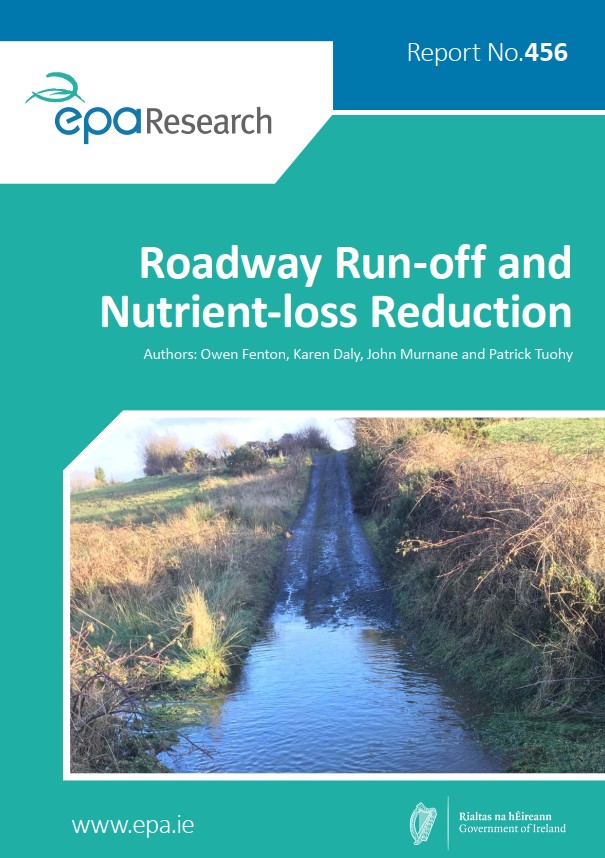
Research 456: Roadway Run-off and Nutrient-loss Reduction
Authors: Owen Fenton, Karen Daly, John Murnane and Patrick Tuohy, June 2024
Year: 2024
The Nitrates Directive aims to protect water quality across Europe by preventing nutrients from agricultural sources, including livestock manures and other fertilisers, from polluting ground and surface waters, and by promoting good farming practices. Ireland’s Nitrates Action Programme states “There shall be no direct runoff of soiled water from farm roadways to waters”. Despite existing regulation, there has been minimal research in Ireland pertaining to the source, content, pathway, mobilisation and impact of roadway runoff. The Roadrunner project reviewed mitigation measures to treat roadway runoff, developed an on-farm visual tool to find and document connectivity between roadway runoff and waters, and provided the evidence base to define roadway runoff as a unique sub-component of the nutrient transfer continuum.
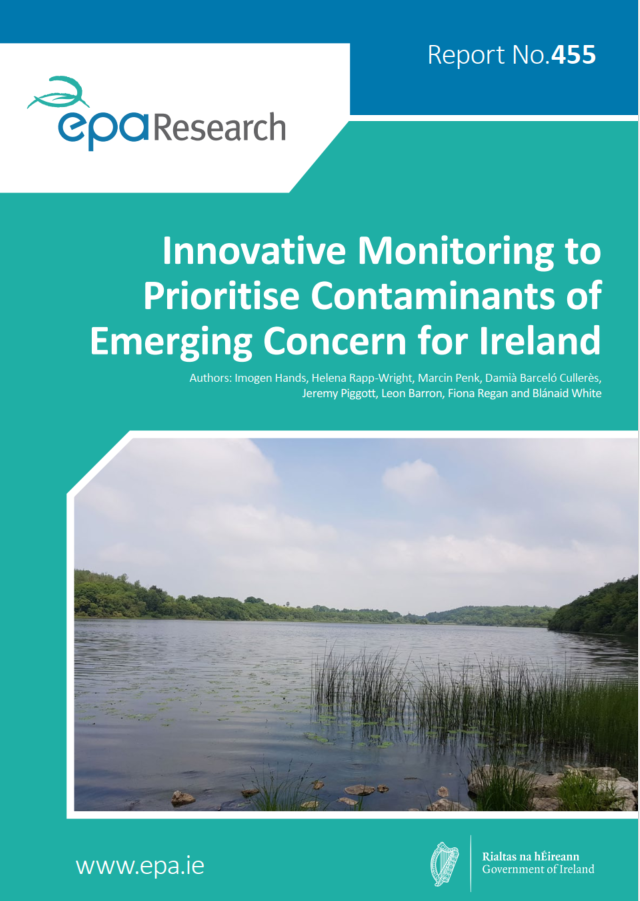
Research 455: Innovative Monitoring to Priorities Contaminants of Emerging Concern for Ireland (IMPACT)
Imogen Hands, Helena Rapp-Wright, Marcin Penk, Damià Barceló Cullerès, Jeremy Piggott, Leon Barron, Fiona Regan and Blánaid White, April 2024
Year: 2024
Contaminants of Emerging Concern (CECs) can be defined as “any synthetic or naturally occurring chemical or any microorganism that is not commonly monitored in the environment but has the potential to enter the environment and cause known or suspected adverse ecological and/or human health effects”. This research provides a comprehensive insight into the occurrence and fate of CECs in wastewater treatment effluent on entry to Irish receiving waters. Two wastewater treatment plants (WWTPs), one urban and one rural were monitored for one year to identify the temporal and spatial occurrence of more than 100 CECs in the aquatic environment and the WWTPs influents and effluents. This work allows contaminants that are not efficiently removed during treatment of municipal effluents to be highlighted and enables an evidence-based prioritisation list of CECs to be developed in Ireland.
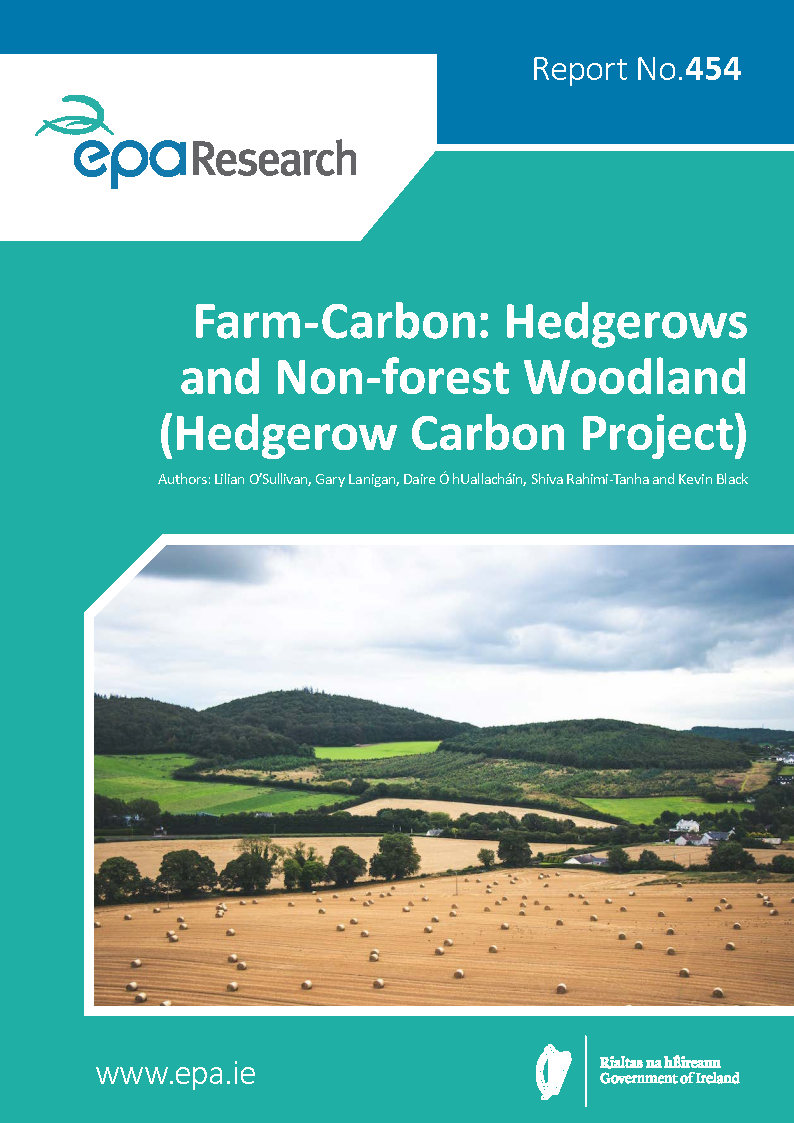
Research 454: Farm-Carbon: Hedgerows and Non-forest Woodland (Hedgerow Carbon Project)
Authors: Lilian O’Sullivan, Gary Lanigan, Daire Ó hUallacháin, Shiva Rahimi-Tanha and Kevin Black, March 2024
Year: 2024
The EU aims to be climate neutral by 2050. Central to this ambition is land management that supports carbon sequestration, and enhancement of carbon sinks or the reversal of their emissions. Current national greenhouse gas emission inventory submissions to the United Nations Framework Convention on Climate Change show that the land use, land use change and forestry (LULUCF) sector is a net source of emissions in Ireland. However, emissions and removals are not currently disaggregated in national emission inventory estimates. Currently, hedgerows are not explicitly accounted for in national inventory reports.
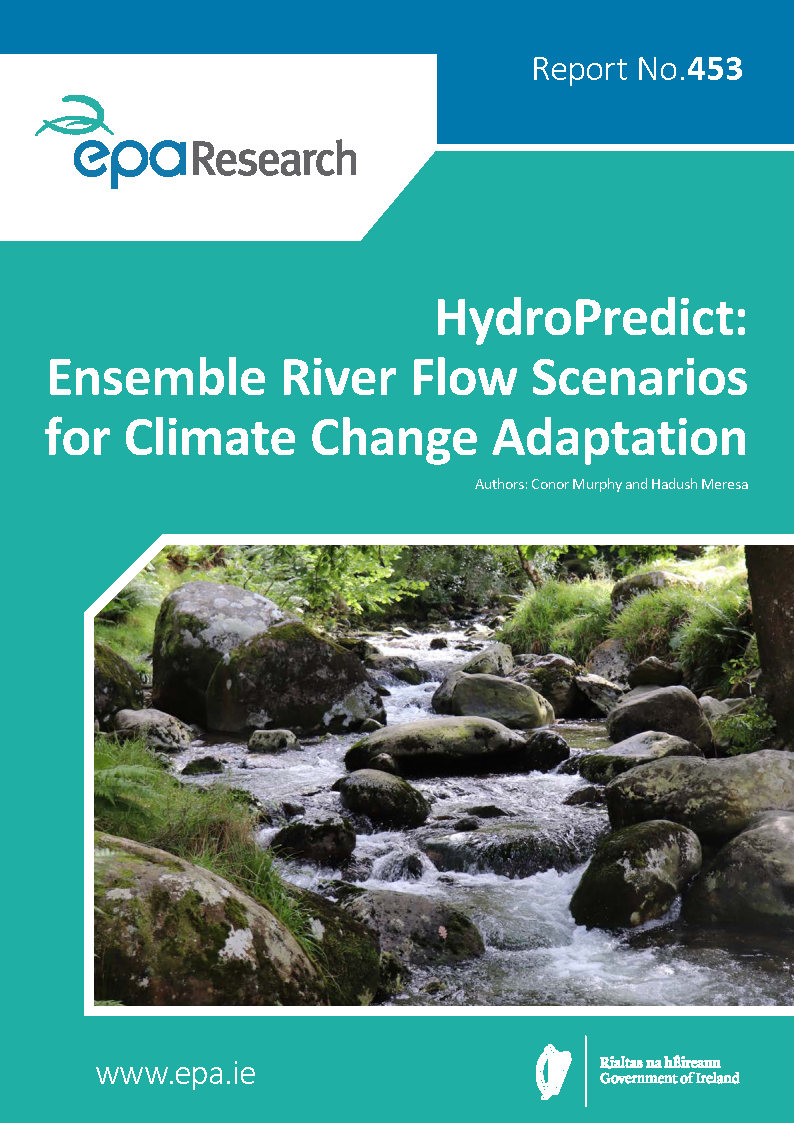
Research 453: HydroPredict: Ensemble River Flow Scenarios for Climate Change Adaptation
Authors: Conor Murphy and Hadush Meresa, March 2024
Year: 2024
Higher greenhouse gas emissions are associated with large reductions in average summer and annual low flows in rivers. Changes in meteorological droughts in Ireland are driven by a transition to wetter winters and drier summers, together with increased evapotranspiration losses during summer and late spring months, leading to more frequent spring and summer droughts. The magnitude of future drought changes depends on future greenhouse gas emissions, with the most substantial changes found for higher emissions. Adapting to climate change in the water sector should place an increased emphasis on addressing the changing nature of droughts, especially across sensitive sectors. Using the latest climate models and emissions storylines, this research project assessed the projected impacts of climate change on flow conditions and droughts across 37 river catchments in Ireland.
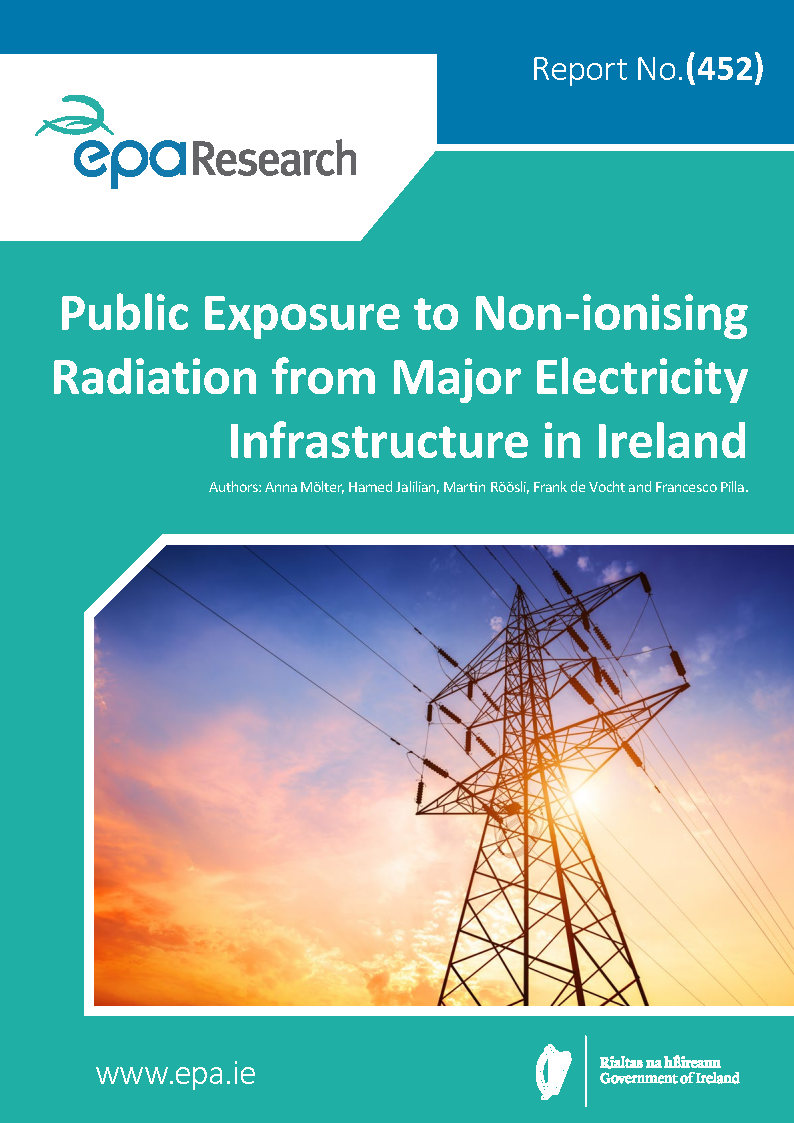
Research 452: Public Exposure to Non-ionising Radiation from Major Electricity Infrastructure in Ireland
Authors: Anna Mölter, Hamed Jalilian, Martin Röösli, Frank de Vocht and Francesco Pilla, March 2024
Year: 2024
Major electricity infrastructure, such as high-voltage power lines, transformer stations and substations, emits non-ionising radiation in the form of extremely low-frequency electromagnetic fields (ELF EMFs). Potential health effects associated with long-term exposure to ELF EMFs have been a concern since the late 1970s. However, epidemiological studies of health risks of ELF EMF exposure have reported varying results, and a causal relationship has not been established. This research report presents a review on the published literature in relation to populations exposure to ELF EMFs, epidemiological studies on associated health risks, current EU policies, monitoring strategies, methods to reduce exposure and strategies for risk communication.
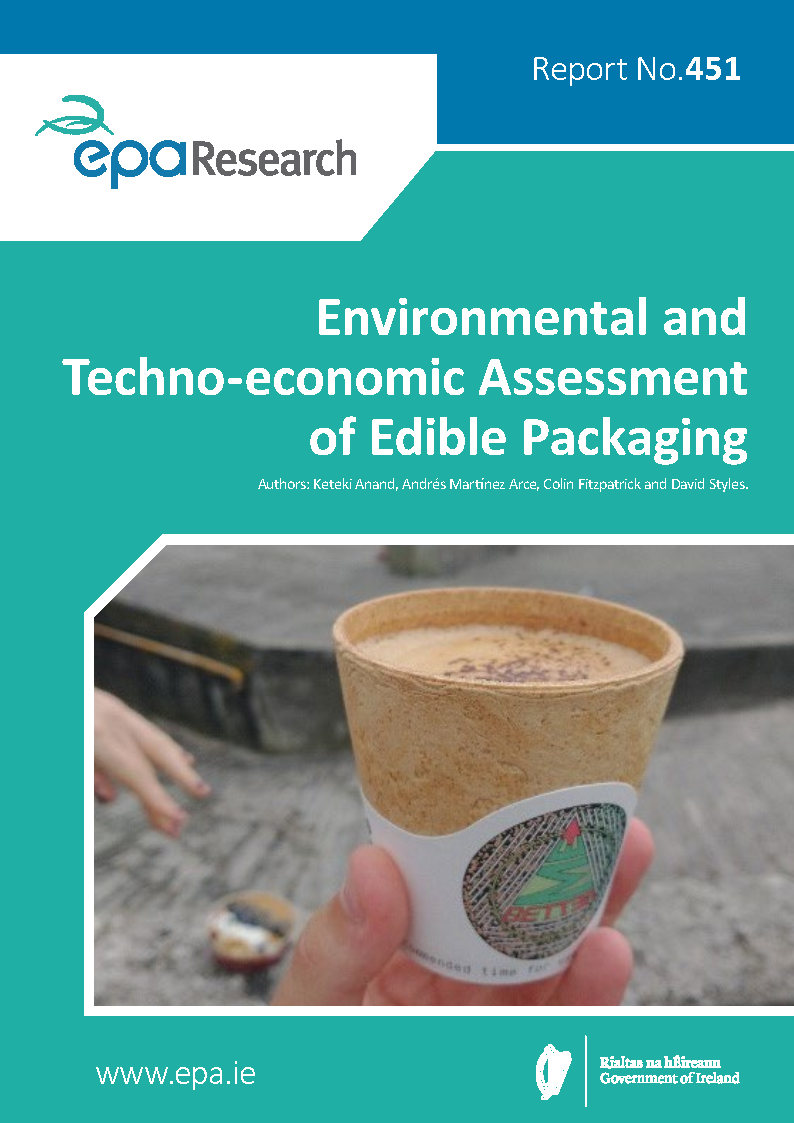
Research 451: Environmental and Techno-economic Assessment of Edible Packaging
Authors: Keteki Anand, Andrés Martínez Arce, Colin Fitzpatrick and David Styles, March 2024
Year: 2024
It is estimated that 550,000 cups per day are used in the Irish market alone, and that this could increase to an annual total of 300 million cups per year by 2025. Although there is a common perception among consumers that paper cups are recyclable, and thus a sustainable option, this is not necessarily true. These cups are lined with plastic, which is difficult to separate from the paper, and most paper cups are sent to residual waste streams for landfill or incineration. The concept of edible packaging has the potential to help address littering and waste management challenges from single-use disposable cups. EAT-Packaging undertook a life cycle assessment across a range of relevant cup types and engaged with national stakeholders to develop scenarios to identify where, when, and how edible cups (or alternative options) could reduce environmental impact for the functional unit of a cup containing a single drink.

Research 450: Infrastructure Climate Change Risk Considering Interdependencies and Cascading Hazards
Authors: Ilaria Bernardini, Mark Tucker, Moreno Stellini and Emmanouil Kakouris, February 2024
Year: 2024
Extreme weather events such as storms, landslides, river floods and coastal phenomena have threatened and damaged many different regions across Ireland. These events, while rare and often short-lived, can have a devastating impact on critical infrastructure systems. As a result of climate change, these events are becoming more frequent and more intense, affecting not only physical infrastructure but also the environment and society as a whole. Using risk-based approaches in assessing the impacts of extreme weather events and climate change is a well-established method of identifying the most vulnerable infrastructure, assessing the risks posed to that infrastructure and developing strategies to minimise those risks. This report presents an overarching risk assessment methodology for assessing risks posed to critical infrastructure by climate change.
-449.jpg)
Research 449: Transboundary Climate Risks for the Island of Ireland (TCRII)
Authors: Conor Murphy, Kevin Leonard, Rory Moore and Stephen Flood, February 2024
Year: 2024
The island of Ireland is one of the most open economies in the world for trade and finance. While Ireland’s open economy, trade and finance links have helped to generate significant wealth and improve living standards, this also makes Ireland among the most vulnerable to climate change’s impacts on international trade. Transboundary Climate Risks (TCRs) cross national borders and are associated with the impacts of climate change. The Transboundary Climate Risks for the Island of Ireland (TCRII) project undertook a literature review and worked with stakeholders to identify approaches for the assessment of TCRs and synergies that can be leveraged on an all-island basis. The findings informed recommendations for better accounting for these emerging risks, to realise the national climate objective of achieving a climate-resilient economy and society by 2050.